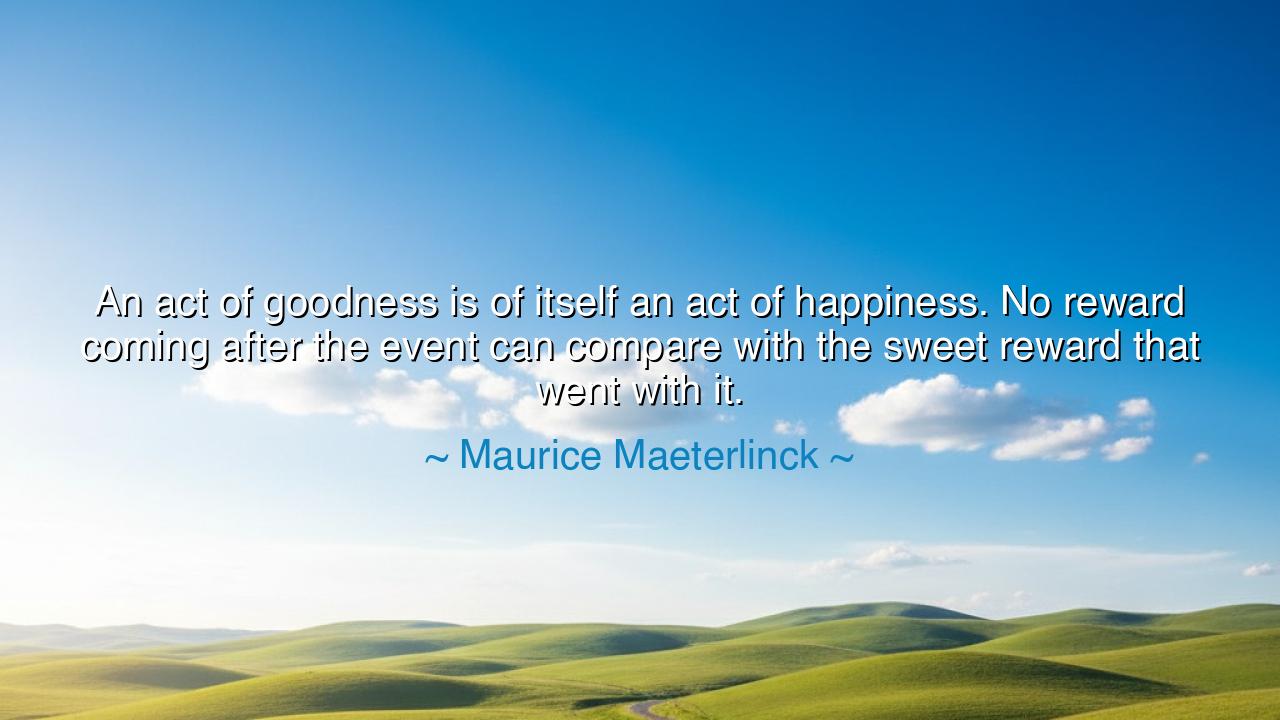
An act of goodness is of itself an act of happiness. No reward
An act of goodness is of itself an act of happiness. No reward coming after the event can compare with the sweet reward that went with it.






“An act of goodness is of itself an act of happiness. No reward coming after the event can compare with the sweet reward that went with it.” — thus spoke Maurice Maeterlinck, the mystic dramatist and philosopher of Belgium, whose words echo like a soft bell through the corridors of time. In this brief utterance, he reveals a truth older than kings and deeper than temples: that goodness carries within it its own reward, that happiness is not something earned through praise or gain, but something born in the very moment of giving. To do good, he teaches, is to touch the divine pulse of joy that beats within all creation.
Maeterlinck, who spent his life seeking the hidden harmony of the universe, wrote not as a preacher of doctrine but as a seer of the soul. He believed that behind every act of love, every kindness, every gentle word, there shines a secret light—a vibration of happiness so pure that no crown or gold could ever equal it. This truth, he said, does not need to be proven, for every heart has felt it: the quiet joy that follows a generous act, the serenity that lingers after forgiveness, the peace that no worldly reward can reproduce. Such is the sweet reward of goodness, fleeting in time but eternal in spirit.
The ancients, too, understood this law. The wise Confucius taught that the virtuous man finds delight in virtue itself; the Stoics declared that goodness is its own purpose, not a path to favor or fame. And in the teachings of the Buddha, compassion was called the “bliss of release,” for in helping others one is freed from the tyranny of self. Maeterlinck simply placed this eternal insight into the language of his age: that when one performs an act of goodness, one need not wait for happiness—it blooms instantly, like a flower opening to the sun.
Consider the tale of Oskar Schindler, a man who began as an opportunist in the dark days of war but became a savior to over a thousand souls. He spent his fortune, risked his life, and defied his country to shelter the persecuted. When the war ended, he stood penniless, yet richer than he had ever been. “Whoever saves one life saves the world entire,” they said of him—and indeed, he felt that truth not in applause or reward, but in the sweetness of having done good. His joy was not delayed until history honored him; it was present in every moment he defied cruelty for the sake of love.
This, then, is the meaning of Maeterlinck’s wisdom: that goodness is not a transaction but a transformation. Those who do good expecting return will find their joy fleeting, like a shadow cast by setting sun. But those who act from the heart discover that the act itself is heaven enough. The joy of giving, the quiet radiance of selfless action—these are the treasures that cannot be taken away. For every kind deed reshapes the soul of the doer, polishing it into something purer, lighter, more luminous.
And yet, in a world that worships reward and recognition, such a truth seems forgotten. Many strive to be seen as good rather than to be good; they plant trees not for shade but for applause. But Maeterlinck’s words call us back to the ancient path—the way of inner integrity. True happiness does not wait at the end of the journey; it walks beside us in every step of kindness. Each smile given, each burden shared, each moment of compassion—these are already the gold of eternity.
Therefore, my child, if you wish to live wisely, do not ask, “What will I gain by this act?” Ask instead, “What light will it bring into the world?” Do good quietly. Help without expecting thanks. Give without thought of return. For in that very instant, when your heart moves freely and your hand opens in love, you will feel the sweet reward that Maeterlinck spoke of—the still, unshakable joy that is older than time.
And when your life draws to its close, and all the trophies and treasures of the world fade into dust, you will see that the only moments that truly mattered were those when you gave, forgave, and loved. For goodness is happiness, and to live in goodness is to dwell in the eternal joy of the soul—a joy no reward can match, and no death can take away.






AAdministratorAdministrator
Welcome, honored guests. Please leave a comment, we will respond soon